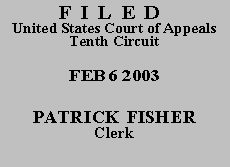

| UNITED STATES OF AMERICA,
Plaintiff - Appellee, v. HAROLD EUGENE COMBS, Defendant - Appellant. |
No. 02-6120 D.C. Nos. 99-CV-102-M
and CR-97-17-M |
ORDER AND JUDGMENT(*)
Defendant Harold Eugene Combs seeks a certificate of appealability (COA) from this court in order to appeal the district court's order denying relief in his motion brought pursuant to 28 U.S.C. § 2255. We deny Mr. Combs' application and dismiss the appeal.
To be entitled to a COA, Mr. Combs must make a "substantial showing of the denial of a constitutional right." 28 U.S.C. § 2253(c)(2). He can make this showing by establishing that "reasonable jurists could debate whether (or, for that matter, agree that) the petition should have been resolved in a different manner or that the issues presented were adequate to deserve encouragement to proceed further." Slack v. McDaniel, 529 U.S. 473, 484 (2000) (internal quotation marks omitted). We will grant relief if we determine that "the judgment was rendered without jurisdiction, or that the sentence imposed was not authorized by law or otherwise open to collateral attack, or that there has been such a denial or infringement of the constitutional rights of the prisoner as to render the judgment vulnerable to collateral attack." 28 U.S.C. § 2255.
Mr. Combs was charged along with four co-defendants in a twenty-two count indictment. The jury found him guilty of conspiracy to possess with intent to distribute and distribution of cocaine base, interstate transportation in aid of racketeering, use of a telephone to further the conspiracy, and money laundering. He was sentenced to 360 months' imprisonment and five years' supervised release.
Mr. Combs filed an appeal in which he argued he was denied a fair trial and deprived of due process due to perjured testimony from government witnesses. This court affirmed his conviction. United States v. Combs, No. 97-6219, 1998 WL 17767 (10th Cir. Jan. 20, 1998).
Mr. Combs filed this motion seeking relief under § 2255 in district court in which he alleged he had received ineffective assistance of trial and appellate counsel because trial counsel had failed to object to (1) cooperating witness testimony, (2) jury instruction No. 30 on interdependence, and (3) his sentence which exceeded the sentencing guideline range. He contended that appellate counsel was ineffective because he had failed to raise those issues. Mr. Combs then moved to amend his complaint to add several claims based on Apprendi v. New Jersey, 530 U.S. 466 (2000). The district court granted the motion, but denied relief holding that Mr. Combs had failed to show ineffective assistance of counsel and that Apprendi is not retroactive to habeas petitions.
On appeal, Mr. Combs argues only that the district court erred in denying his Apprendi claims. He maintains the trial court improperly imposed a sentence beyond the statutory maximum and removed essential elements from the jury's province because the jury was not instructed to determine the type and quantity of drugs involved.
This court has held that Apprendi is not retroactive to initial § 2255 motions. United States v. Mora, 293 F.3d 1213, 1219 (10th Cir.), cert. denied, 123 U.S. 388 (2002). Reasonable jurists could not debate whether his § 2255 "petition should have been resolved in a different manner" or whether "the issues presented were adequate to deserve encouragement to proceed further." Slack, 529 U.S. at 484 (internal quotation marks omitted). Consequently, Mr. Combs has failed to make a "substantial showing of the denial of a constitutional right" and is not entitled to a COA. 28 U.S.C. § 2253(c)(2).
We deny a COA and DISMISS this appeal. Mr. Combs' motion to proceed in forma pauperis is GRANTED. The mandate shall issue forthwith.
Entered for the Court
Circuit Judge
*. This order and judgment is not binding precedent, except under the doctrines of law of the case, res judicata, and collateral estoppel. The court generally disfavors the citation of orders and judgments; nevertheless, an order and judgment may be cited under the terms and conditions of 10th Cir. R. 36.3.